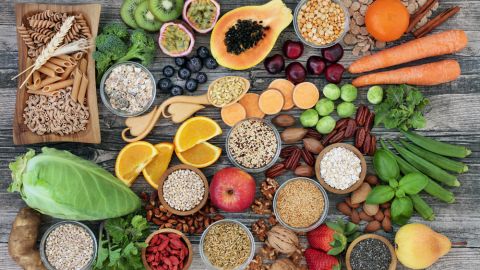Finally, having enough fibre in your diet can help increase overall longevity. There are other potential benefits of a healthy fibre intake, such as a lower incidence of heart disease, better blood sugar control, and maintaining a healthy weight. Fibre, including soluble and insoluble fibre, is naturally found in foods such as fruits, vegetables, and whole grains, and in supplements.
Dietary fibre is best known for regulating the digestive system, but adequate fibre intake can also reduce the risk of chronic diseases, including type II diabetes, cardiovascular disease, and certain types of cancer. People on a very high fibre diet should avoid fibre supplementation as excessive intake can lead to diarrhea and, as a result, decreased absorption of minerals, vitamins, and energy. If you are taking any medications (such as ibuprofen), talk to your doctor if you can start taking fibre supplements.
To experience the full benefits of dietary fibre, take your supplement a few minutes before meals. If you still can’t get enough fibre for your daily recommendations, consider using a supplement. Safety of additives. While there is no evidence that fibre supplements are harmful, it is best to get fibre from natural sources so you can better reap the health benefits of dietary fibre.
It is best to get fibre from food, because supplements do not contain the vitamins, minerals and other nutrients found in high-fibre foods. There is no doubt that you need fibre to maintain a healthy body, but the fibre you get from supplements is usually not comparable to the complete and inherent fibre in natural foods. It is very suitable for obtaining fibre from dietary sources because these foods are rich in other nutrients your body needs. Fruits, vegetables, whole grains, legumes, nuts, and seeds are rich in fibre. Although food best meets your needs, supplements may be a beneficial way to increase your intake.

Types of fibre Soluble fibre absorbs water from food and turns into a gel-like substance, slowing down digestion. You can also add soluble fibre, which absorbs water from your stomach and intestines and then becomes a gel-like consistency. Depending on the reason you plan to use fibre supplements, you can choose supplements that contain only soluble or insoluble fibre or a combination of both. If your goal is to support metabolism and lower cholesterol levels, try taking soluble fibre supplements; if you need supplements for laxative effects, choose the insoluble type.
When you use fibre supplements, whether it is soluble fibre supplements or insoluble fibre supplements, it can help produce softer, fuller stools that are easier to eliminate. Fibre increases stool volume and retains moisture, making it easier to pass stool.
Of course, the main benefit we associate with fibre is its ability to normalize bowel function. In addition, because fibre is naturally occurring, bacteria in the colon ferment it, which can cause gas and bloating. It can help relieve digestive discomfort that can result from a sudden increase in fibre.
Acacia heather pouch, senegal, available online. Supplement forms are often derived from chicory root and are usually 100% soluble fibre. Functional foods like chia and flaxseed are also considered high fibre options if you are looking for an alternative to conventional supplements on the market.
However, each type of fibre has unique health benefits, which you will learn about in the next section. While the best fibre supplements can fill a daily fibre deficit, they usually contain only one type of fibre, rather than a range of fibre and micronutrients, and may not provide all of the health benefits associated with fibre in foods. For this reason, often people who make poor dietary choices or are on a low fibre diet (low in vegetables, fruits, whole grains, nuts, and seeds) may need extra fibre supplementation to compensate for the resulting inefficiencies and maintain their digestion and health. intestines.
When choosing a supplement, determine your fibre goals and which options have been rigorously clinically tested. According to the Harvard School of Public Health, the recommended daily fibre intake is 20-30 grams (g). If you are a man in your 50s, you should aim for 38 grams of fibre per day.
When adding fibre to your diet, it is more important to drink plenty of fluids to prevent dehydration. You can choose a fibre powder supplement to be taken with a liquid, such as water. This type of powder can also be added to oatmeal, yogurt, applesauce, or homemade muffins.
Typically manufactured fibres include polydextrose, polyols, and maltodextrins. Natural fibre sources used include lignin (a compound found in plant cells), cellulose (a sugar found in plant cells), pectin (a sugar found in fruits and berries), and psyllium husk (the only additional fibre noted to help lower LDL levels cholesterol). “Bad” cholesterol). Extracted natural fibres include lignin (a compound found in plant cells), cellulose (sugar found in plant cells), pectin (sugar found in fruits and berries), gum (sugar found in seeds), and psyllium (from the peel plants). Psyllium plants are the only extra fibre that has been shown to help lower “bad” LDL cholesterol.).
Psyllium supplements include Metamucil pills and fibre powder. Keep in mind that many psyllium foods contain additives such as sugar. It is mainly used in the food industry to increase the fibre content of processed foods (so the next time you see the “High Fibre” message, check the product’s ingredient list, you might see inulin).
It comes from the outer shell of the seeds of Psyllium and contains soluble and insoluble fibres. Unlike most insoluble fibres, it retains water well, thickens in the intestines, and effectively accelerates bowel movements. Soluble fibre can also bind fatty acids and excrete them from the body, thereby reducing low-density lipoprotein (LDL) cholesterol. If you suffer from diabetes or high blood sugar, taking in enough fibre, especially soluble fibre, can help you metabolize sugar more slowly, thereby lowering blood sugar.




